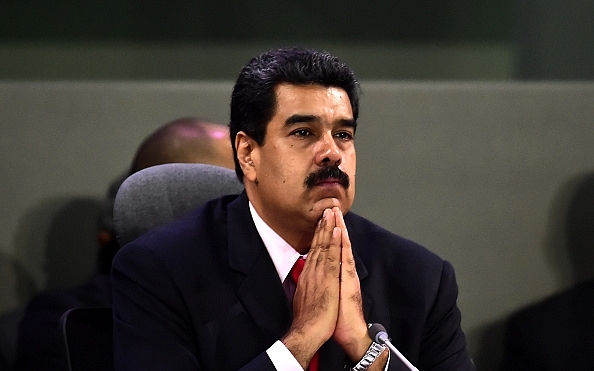Insta
Venezuela: Amid Fears Of Default, Maduro’s Socialist Government Says It Is Seeking Debt Restructuring

President Nicolas Maduro
Venezuela is looking to restructure all its foreign debt, President Nicolas Maduro said today - the day state-owned oil company PDVSA had to pay USD 1.1 billion in maturing bonds to avoid a default.
"I decree a refinancing and a restructuring of external debt and all of Venezuela's payments," Maduro said, adding that PDVSA would make its bond payout on Friday.
Overcoming the first of many hurdles last week, PDVSA made an $842 million principal payment on its bond. It, however, delayed payment under a 30-day grace period of an $81 million bond payment that was due on 12 October.
“I am naming a special presidential commission led by Vice President Tareck El Aissami to begin refinancing and restructuring all of Venezuela’s external debt and the fight against the financial persecution of our country,” Maduro has said.
However, sanctions imposed by the United States in August bar American banks from participating in or even negotiating such deals, leaving Venezuela with fewer avenues to restructure the debt. Sanctions have also brought multiple challenges, including problems in sending cash into the accounts of creditors. According to Bloomberg Markets, Venezuelan officials have said that less-critical interest payments have gotten held up in the payment chain because of US sanctions.
Maduro’s government and the state oil company owe some $1.6 billion in debt service and delayed interest payments by the end of 2017 and $9 billion in bond servicing in 2018, Reuters reported, adding that default is increasingly likely.
Venezuela's total external debt is estimated at USD 150 billion. The country, which today holds the largest proven reserves of crude oil, is already deep into a humanitarian crisis. The crisis worsened after Maduro’s oil-financed socialism failed to survive the collapse of the crude oil markets. Crashing oil prices have left the government with little foreign currency to buy goods. Imports are down 50 per cent from a year ago, pushing the country into a deep hunger crisis.
Support Swarajya's 50 Ground Reports Project & Sponsor A Story
Every general election Swarajya does a 50 ground reports project.
Aimed only at serious readers and those who appreciate the nuances of political undercurrents, the project provides a sense of India's electoral landscape. As you know, these reports are produced after considerable investment of travel, time and effort on the ground.
This time too we've kicked off the project in style and have covered over 30 constituencies already. If you're someone who appreciates such work and have enjoyed our coverage please consider sponsoring a ground report for just Rs 2999 to Rs 19,999 - it goes a long way in helping us produce more quality reportage.
You can also back this project by becoming a subscriber for as little as Rs 999 - so do click on this links and choose a plan that suits you and back us.
Click below to contribute.
Latest